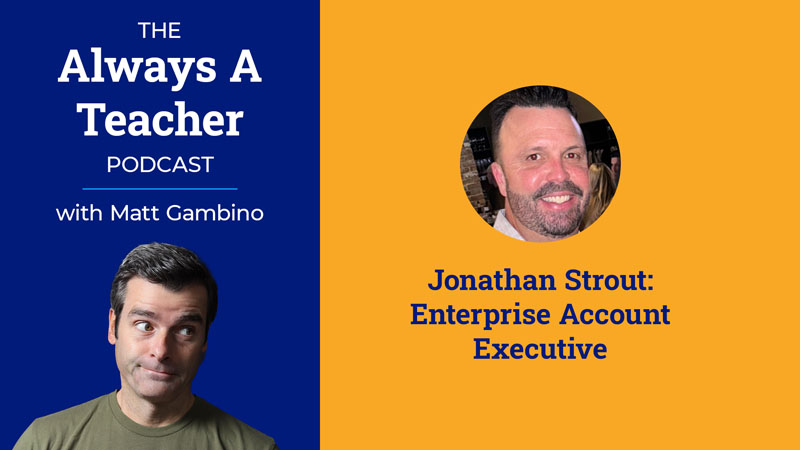
Show Notes
Jonathan Strout truly loved his job as a high school principal. But after 24 years in education, the 24/7/365 stress, especially post-pandemic, led him to an "inflection point." He was missing his kids' lives and felt the overwhelming stress was becoming a health risk. In this episode, Jonathan shares his decision to leave administration for a remote sales role, a move driven by three "non-negotiables": work flexibility, staying in edtech, and earning potential. He also discusses the "guilt" of leaving and the single biggest challenge he faced in his transition: shifting his entire mindset from being a reactive "problem-solver" to a proactive "problem-finder."
- The "Why" He Left: Jonathan gets candid about the "nonstop 24/7" stress of being a building leader and his desire for "work-life flexibility" to be more present for his three children.
- The "Talent Show" Moment: A pivotal story about his daughter in second grade, and how her "wise beyond her years" perspective on favoritism became a "huge part of the decision" to leave.
- Why Sales? Jonathan breaks down his three non-negotiables (remote work, edtech, salary) and explains why sales was the one role that met all his criteria, whereas pedagogical or success roles had "limitations financially."
- Problem-Finder vs. Problem-Solver: The biggest "fish out of water" shock was shifting from a principal's reactive world of 300 emails a day to a sales role where he had to proactively *find* the problems.
- Stop Leading with Your Title: He shares why he "cringes" thinking about his first year in sales and why he no longer leads with "I was a principal," focusing instead on being a "trusted advisor."
Episode Article
On his LinkedIn banner, Jonathan Strout has two images: the logo for his employer, Renaissance Learning, and a photo of him at a graduation ceremony as a high school principal. That duality captures his journey perfectly. After 24 years as a teacher, counselor, and principal, he loved his job. "I was in my office every day at 5:45 with a smile on my face," he recalled. But the non-stop, high-stakes stress of being a building leader, especially after the pandemic, had taken its toll. "I didn't want to feel like I died in that job," he shared, "I felt like my stress level was at a point where I was moving toward potential health concerns."
The decision to leave was about more than just stress; it was about his family. He realized he was missing his own kids' lives. He shares a "pretty big" piece of his decision: a memory of his daughter, Eliana, in second grade. She had gotten into the school talent show (which he, as principal, oversaw) and confessed she felt "the only reason I got picked is because my dad was a principal." He made the leap to edtech, in part, so she could navigate high school, be her own person, and never have to question whether "she had the merit and earned the thing that she had got."
When he decided to move, Jonathan had three non-negotiables: remote work for family flexibility, staying in edtech, and the earning potential to replace his administrator salary. "I would have... enjoyed something on the pedagogical side," he admitted, "but I also knew that there would be limitations financially." Sales was the one role that checked all three boxes.
The biggest challenge wasn't the work, but the *workflow*. "As a principal, you're probably used to getting 250 to 300 emails a day," he said, "and now you have to flip a switch." He had to shift from being a reactive "problem-solver" to a proactive "problem-finder"—a change that was not as easy as it sounds. His advice to educators is to do deep "soul searching" to make sure you're leaving for the right reasons, and then be "unapologetically assertive" in going after what you want.
